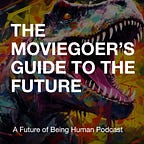Chapter 11 of Films from the Future: The Technology and Morality of Sci-Fi movies, read by author Andrew Maynard
In this episode: Inferno
Decoding Make-Believe | Weaponizing the Genome | Immoral Logic? | The Honest Broker | Dictating the Future
I wrote chapter 11 of Films from the Future in 2018, two years before COVID was to sweep around the world. Yet looking back, the narrative around bioengineered viruses and global pandemics that was inspired by Dan Brown’s Inferno was eerily prescient.
From today’s perspective, it’s quite sobering how close to the start of the COVID pandemic we were when I wrote this:
The outbreak of Spanish flu in the early 1900s is estimated to have killed around fifty million people, or around 3 percent of the world’s population at the time. If an equally virulent infectious disease were unleashed on the world today, this would be equivalent to over 200 million deaths, a mind-numbing number of people. However, the relative death toll would likely be far higher today, as modern global transport systems and the high numbers of people living close to each other in urban areas would likely substantially increase infection rates.
It’s this sort of scenario that keeps virologists and infectious-disease epidemiologists awake at night, and for good reason. It’s highly likely that, one day, we’ll be facing a pandemic of this magnitude. Viruses mutate and adapt, and the ones that thrive are often those that can multiply and spread fast. Here, we know that there are combinations of properties that make viruses especially deadly, including human pathogenicity, lack of natural resistance in people, and airborne transmission. There are plenty of viruses that have one, or possibly two, of these features, yet there are relatively few that combine all three. But because of the way that evolution and biology work, it’s only a matter of time before some lucky virus hits the jackpot, much as we saw back in 1918.
Because of this, it makes sense to do everything we can to be prepared for the inevitable, including working out which viruses are likely to mutate into deadly threats (and how) so we can get our defenses in order before this happens.
Sadly, we weren’t prepared, and we suffered global (and continuing) consequences as result.
What is even more eerie is that one of the chapter’s primary foci was “gain of function” research, and specifically research into making viruses more virulent.
At the time, this was cutting edge research that few people were paying close attention to outside specialized circles. And yet now, because of concerns that COVID may have had its origins in such research, the concept of gain of function research — and its potential dangers — is now a familiar one.
I must confess that, on one level, this makes the chapter feel a little dated — we’ve literally lived the future it warns against. And yet beyond the specifics, the chapter also grapples with challenges that are still very real — including how scientists struggle to navigate the fine line between research, social responsibility, and activism.
Here, the chapter (and the podcast) explores the idea of the “honest broker” — a concept that was developed and popularized by Roger Pielke Jr.
If you’re at all interested in the complex dynamic between ideology-driven actions and the tension between science and activism, I’d strongly recommend checking out Roger’s work, including his Substack which, appropriately, is called The Honest Broker.
And of course, do listen to the podcast as well!
About Films from the Future: I started writing Films from the Future in 2017. The intent was to explore the deeply complex landscape around emerging technologies, the future, and socially responsible innovation, in a way that would be accessible to most readers, and at the same time provide nuanced and important insights that weren’t available anywhere else.
One of the challenges with most books about tech and the future is that they take a polarized stance — we’re either all going to die unless we do something different, or technology is going to save the world. These sell — people love reading about extremes. But they’re not that helpful when it comes to navigating a deeply complex tech innovation landscape where there few right and wrong answers, where it’s important to weave together insights from many different areas of expertise — including the arts and humanities, and where dialogue and discussion are far more important than preaching.
And so I set out to write about emerging and converging technologies in as inclusive and accessible a way as I knew how, with the aim of taking readers on a compelling journey into the future where their thoughts and ideas were just as important as mine.
The result was a book that uses movies as a way to open up conversations about what responsible innovation means in a world that’s changing faster than ever before, and where new technologies are transforming how we think about the future and what it holds.
Of course some of the technologies it covers have moved on since I started writing the book. But at the end of the day this is not a book about science fiction movies, or about specific technologies, but about how all of us can think differently about our roles in ensuring the future we’re building is better than the past we leave behind.
I hope you enjoy these recordings of me narrating it — this is a book that reflects my voice quite deeply in the writing, and so it only made sense for me to one day actually read it aloud!
For more information on the book, visit https://andrewmaynard.net/films-from-the-future/











